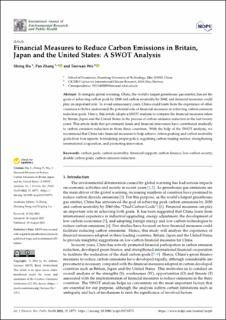Financial Measures to Reduce Carbon Emissions in Britain, Japan and the United States: A SWOT Analysis
Peer reviewed, Journal article
Published version

Åpne
Permanent lenke
https://hdl.handle.net/11250/3116004Utgivelsesdato
2022Metadata
Vis full innførselSamlinger
- Journal articles [478]
Originalversjon
International Journal of Environmental Research and Public Health (IJERPH). 2022, 19 (17), . 10.3390/ijerph191710771Sammendrag
To mitigate global warming, China, the world’s largest greenhouse gas emitter, has set the goals of achieving carbon peak by 2030 and carbon neutrality by 2060, and financial measures could play an important role. To avoid unnecessary costs, China could learn from the experience of other countries to better understand the potential role of financial measures in achieving carbon emission reduction goals. Hence, this article adopts a SWOT analysis to compare the financial measures taken by Britain, Japan and the United States in the process of carbon emission reduction in the last twenty years. This article finds that government funds and financial innovation have contributed markedly to carbon emission reduction in those three countries. With the help of the SWOT analysis, we recommend that China take financial measures to help achieve carbon peaking and carbon neutrality goals from four aspects: formulating proper policy, regulating carbon trading market, strengthening international cooperation, and promoting innovation.
